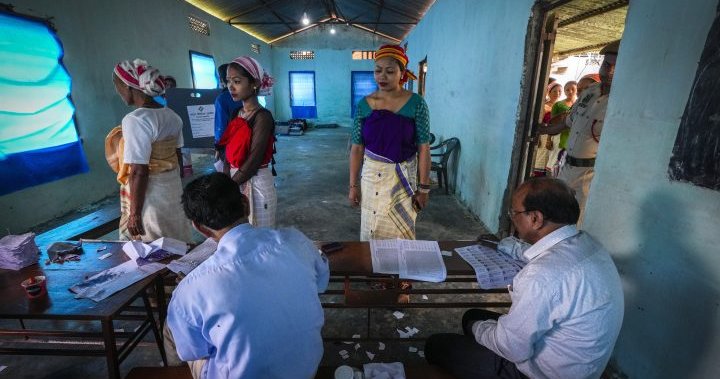Millions of Indians began voting Friday in a six-week election that’s a referendum on Narendra Modi, the populist prime minister who has championed an assertive brand of Hindu nationalist politics and is seeking a rare third term as the country’s leader.
People began queuing up at polling stations hours before they were allowed in at 7 a.m. in the first 21 states to hold votes, from the Himalayan mountains to the tropical Andaman Islands. Nearly 970 million voters — more than 10% of the world’s population — will elect 543 members to the lower house of Parliament for five years during the staggered elections that run until June 1. The votes will be counted on June 4.
This election is seen as one of the most consequential in India’s history and will test the limits of Modi’s political dominance.
If Modi wins, he’ll be only the second Indian leader to retain power for a third term, after Jawaharlal Nehru, the country’s first prime minister.
Most polls predict a win for Modi and his Hindu nationalist Bharatiya Janata Party, who are up against a broad opposition alliance led by the Indian National Congress and powerful regional parties.
It’s not clear who will lead India if the opposition alliance, called INDIA, wins the election. Its more than 20 parties have not put forward a candidate yet.

The BJP controls much of India’s Hindi-speaking northern and central parts, but is now trying to gain a foothold in the east and south. Their toughest challenge is in the southern Tamil Nadu state, with 39 seats, where voting is being held Friday.
Voters in hot and humid Chennai, the state’s capital, began briskly filling the city’s nearly 4,000 polling booths. A number of them said they were voting for a change in federal government given rising prices, unemployment and religious polarization stoked by the BJP.
Breaking news from Canada and around the world
sent to your email, as it happens.
“First thing I came to vote for is to have a country without any religious disharmony. In Tamil Nadu — Hindus, Muslims, Christians, we’re all together. And this unity should grow,” said 65-year-old Mary Das, who was waiting to vote.
P. Chidambaram, an opposition Congress party leader and the country’s former finance minister, said that the people of Tamil Nadu would not vote for the BJP as “it is imposing one language, one culture, one system and one kind of food.”
The BJP has long struggled to capture votes in the state, where two powerful regional parties — the Dravida Munnetra Kazhagam and All India Anna Dravida Munnetra Kazhagam — dominate. The BJP drew a blank in 2019, and won one seat in 2014.
In Rajasthan, people returning from polling stations covered their heads against dusty winds.
“If the new government is able to solve unemployment, then it will be good. People are migrating from this region to earn a living,” said Atinder Singh, 26.

Voting is also taking place in the northeastern state of Manipur, where a near-civil war for a year has triggered ethnic violence. Mobs have rampaged through villages and torched houses, and more than 150 people have been killed.
The election comes after a decade of Modi’s leadership, during which the BJP has consolidated power through a combination of Hindu-first politics and economic development.
Modi has ratcheted up Hindu nationalist rhetoric on the campaign trail, and has sought to present himself as a global leader. His ministers tout him as the steward of a surging India, while his supporters celebrate his campaign promise to make India a developed nation by 2047, when it marks 100 years of independence.
But while India’s economy is among the world’s fastest-growing, many of its people face growing economic distress. The opposition alliance is hoping to tap into this, seeking to galvanize voters on issues like high unemployment, inflation, corruption and low agricultural prices that have driven two years of farmers’ protests.
The opposition — and critics — also warn that Modi has turned increasingly illiberal. They accuse Modi of using tax authorities and the police to harass the opposition, and they fear a third term could undermine India’s democracy. His Hindu nationalist politics, they argue, has bred intolerance and threatens the country’s secular roots.
“Modi has a very authoritarian mindset. He doesn’t believe in democracy. He doesn’t believe in Parliamentarianism,” said Christophe Jaffrelot, a political scientist who has written about Modi and the Hindu right.
Modi insists that India’s commitment to democracy is unchanged. He told a Summit for Democracy meeting in New Delhi in March that “India is not only fulfilling the aspirations of its 1.4 billion people, but is also providing hope to the world that democracy delivers and empowers.”

The Indian leader, who enjoys vast popularity, is targeting a two-thirds majority this time.
The BJP hopes for a landslide win powered by its popular welfare programs, which it says have improved access to clean toilets, health care and cooking gas, as well as providing free grain to the poor.
Moves like the construction of a controversial temple to Ram on the site of a demolished mosque, and the scrapping of the disputed Muslim-majority region of Kashmir’s former autonomy, may resonate with supporters who hail him as the champion of the Hindu majority.
“Any party that comes back for a third term, and with a brute majority, is a scary prospect for democracy,” said Arati Jerath, a political commentator.
Modi’s two terms have seen civil liberties in India come under attack, while implementing what critics say are discriminatory policies. Peaceful protests have been crushed with force. A once free and diverse press is threatened, violence is on the rise against the Muslim minority, and government agencies have arrested opposition politicians in alleged corruption cases.
The BJP has denied its policies are discriminatory and says its work benefits all Indians.










